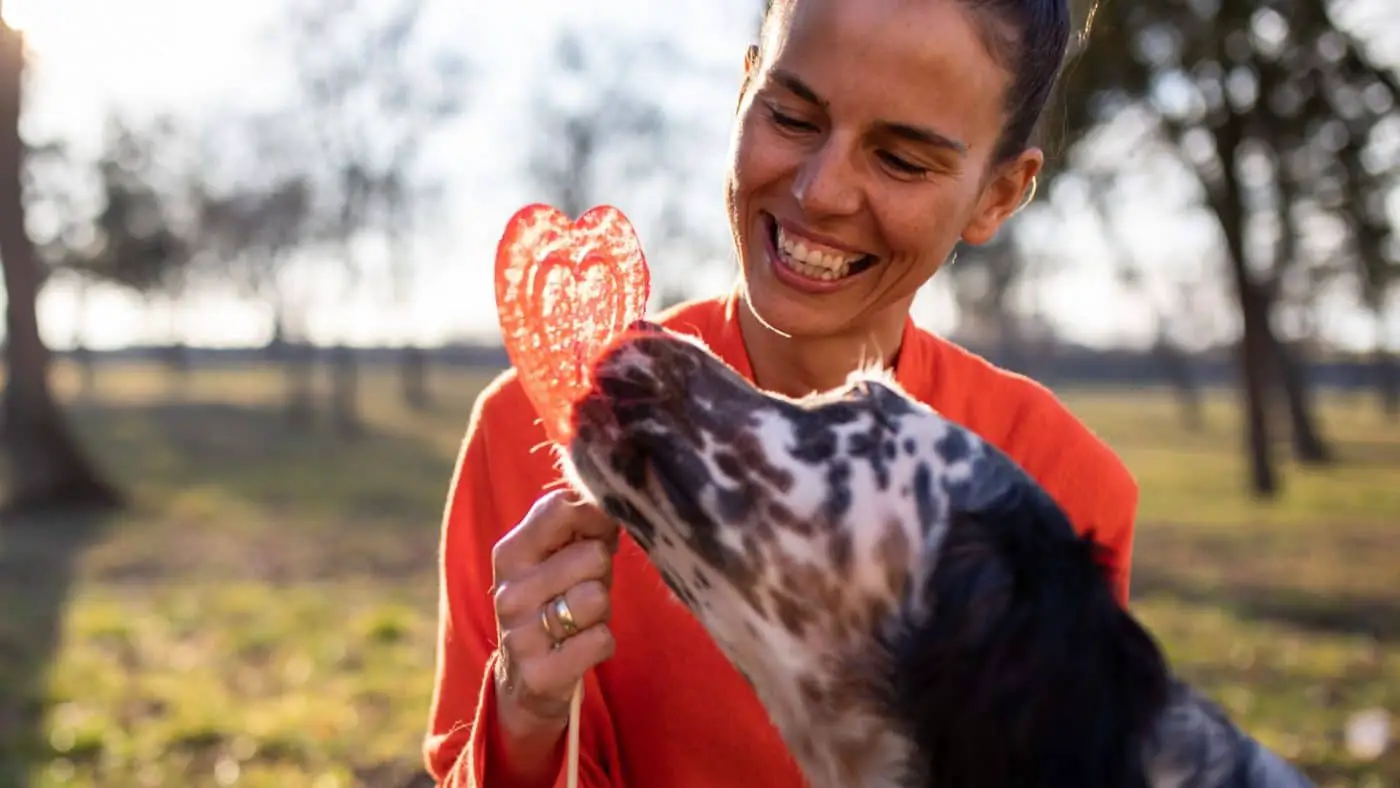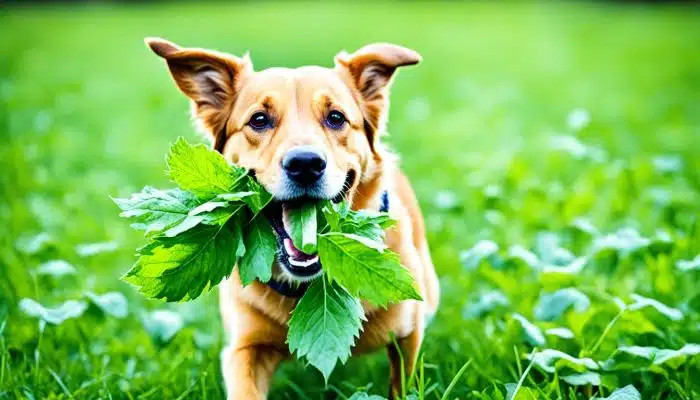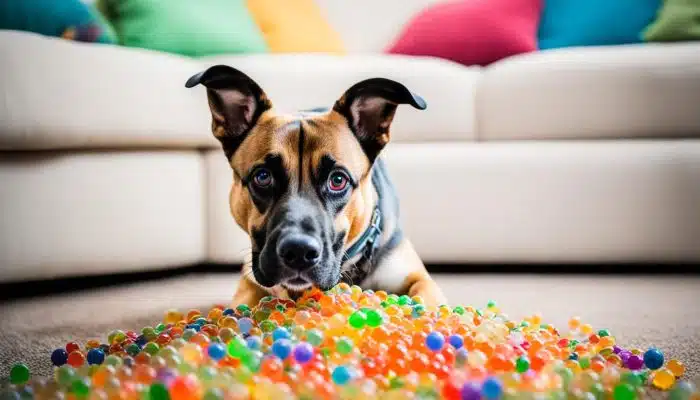Unleash the sweet truth about sharing treats with your furry friend! While lollipops delight human taste buds, they pose hidden dangers for dogs. This article unravels the risks and reveals why sticking to pet-safe treats is crucial.
Have you ever wondered if your furry friend could enjoy a sweet treat like a lollipop? It’s not uncommon for dog owners to share their food with their pets, but sometimes, what we consider harmless can be dangerous. In this article, we will explore the topic of dogs and lollipops.
However, just because humans can consume lollipops doesn’t mean it is safe for our furry friends to do so. As pet owners, we need to be mindful of the food we give our dogs.
The canine diet is than humans; some foods that are safe for us may not suit them. This is why educating ourselves on what foods are unsafe for dogs before feeding them anything outside of their regular diet is crucial.
Feeding your dog something they shouldn’t consume can result in serious health problems like tooth decay, your stomach upset, dog’s blood sugar might rise, or even death in some severe cases. Therefore, understanding what many dogs can and most dogs cannot eat should be a priority for any responsible pet owner. At Pet Gifts & Toys, we discuss whether your dog can eat lollipops.
Curious about safe food options for dogs? Explore our in-depth guide on Healthy Habits for Hounds to learn about delicious and safe choices for your canine companion.
Key Takeaways:
- Avoid Giving Lollipops to Dogs: Lollipops contain high sugar levels and artificial sweeteners like xylitol, which are harmful to dogs and can lead to obesity, dental problems, and potentially fatal conditions like hypoglycemia.
- Choking Hazard: The stick of a lollipop can pose a serious choking hazard or cause internal blockages if ingested by your dog.
- Artificial Colors and Flavors: The artificial dyes and flavorings in lollipops may cause allergic reactions or digestive issues in dogs.
- Monitor and Act Quickly: If your dog accidentally consumes a lollipop, especially one containing xylitol, immediately consult your veterinarian for advice and potential treatment.
- Choose Dog-Safe Treats: Opt for healthy, natural treats designed for dogs to ensure their safety and well-being, avoiding human candy and snacks.
Can Dogs Eat Lollipops?
No, dogs should not eat lollipops. While the temptation to share your sweet treats with your furry friend is understandable, lollipops pose several health risks to dogs. They contain high levels of sugar and may include toxic artificial sweeteners like xylitol, which can lead to serious health issues such as obesity, dental problems, hypoglycemia, and liver damage. Furthermore, the stick of a lollipop can cause choking hazards or internal blockages. For your pet’s health and safety, it’s best to avoid giving them lollipops and instead opt for treats specifically designed for canine consumption.
What are lollipops?
Sweet Treats on a Stick

Lollipops are among the most popular candy treats, loved by children and adults alike. These sweet confectionery delights come in various shapes, sizes, and flavors.
Generally, lollipops consist of a hard candy shell with a soft center on a stick or holder. The origin of the term “lollipop” is not well known.
Some believe it comes from the English word for tongue, “lolly.” In contrast, others think it’s derived from the Northern England dialect, “lolly,” which means tongue. Regardless of its origins, lollipops have become widely popular worldwide and can be found in almost every candy store or confectionery shop.
Ingredients in Lollipops
Lollipops can be made using different ingredients depending on the flavor and type of candy. Common ingredients include sugar, corn syrup, artificial flavors, colors, and some additives like citric acid or malic acid for tartness. There are some of these sugary treats that ar sugar free lollipops but that doesn’t make them better to have your dog eat lollipops.
Some lollipop manufacturers may also add preservatives to extend their shelf life. While most people enjoy these sugary foods without any issues, some may experience allergic reactions due to certain ingredients used in the manufacturing process.
People with sensitivities to food coloring or flavorings should always read product labels before consuming any type of hard candy. Lollipops are delicious but only sometimes healthy due to them having too much sugar and other potentially harmful additives.
So can dogs eat lollipops? Let’s find out in the next section!
Can Dogs Eat Lollipops?
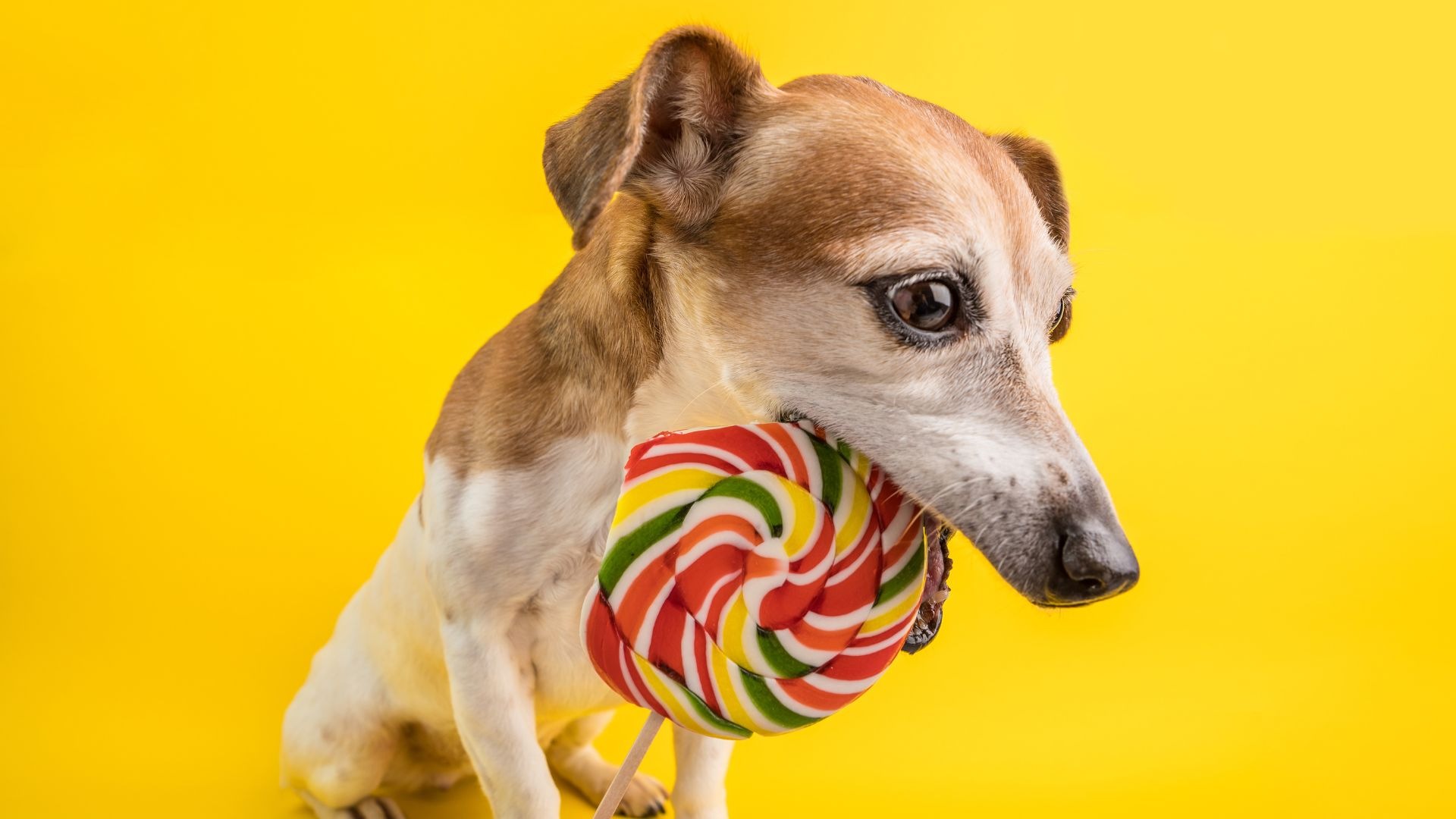
Lollipops are one of the most popular candies in the world, and many different flavors are available. However, when it comes to dogs, lollipops are not recommended. While dogs may be tempted to eat lollipops because of their sweet taste and pleasant aroma, they can harm their health.
Why Lollipops Are Not Recommended for Dogs
The main reason why lollipops are not recommended for dogs is that they contain a lot of sugar. Sugar is bad for dogs as it can lead to obesity, diabetes, and even an infected tooth.
Furthermore, lollipops often come in bright colors, which can attract your dog’s attention. Still, these colors contain artificial dyes that can harm your dog’s health. Another reason lollipops are not suitable for dogs is that they pose a choking hazard which could lead to serious injuries or death if they swallow the stick or get it stuck in their throat.
Potential Health Risks Associated with Feeding Lollipops to Dogs
Feeding your dog lollipop increases the likelihood of them developing health problems such as obesity and diabetes due to them being high sugar treats. The high artificial sweeteners in the content of a lollipop can cause insulin resistance leading to diabetes and tooth decay.
Moreover, some of the ingredients found in lollipops, like xylitol, an artificial sweetener highly toxic to dogs. Xylitol causes a sudden release of insulin resulting in hypoglycemia (low blood sugar), seizures, liver damage and even death if left untreated.
Additionally, some ingredients used in making some brands of lollipops, like citric acid, can cause gastrointestinal upset such as vomiting and diarrhea, leading to dehydration if left unattended. While giving your dog a lollipop may be tempting, it is best to avoid doing so.
The potential health risks far outweigh any short-term enjoyment they may experience. Instead, stick to healthy treats specifically designed for dogs, and always consult with your veterinarian if you have any concerns about what foods are safe for your furry friend.
What should you do if your dog eats a lollipop?
It’s important to act quickly if you suspect that your dog has eaten a lollipop. Even though dogs might seem like they can eat anything, lollipops can cause serious digestive issues. They may even be toxic for your furry friend.
If you catch your dog in the act of eating a lollipop, try to remove it from their mouth as soon as possible. However, if your dog has already swallowed the candy, there are still steps you can take.
Firstly, inspect the wrapper or packaging of the lollipop to see if it contains harmful ingredients such as chocolate or xylitol. If so, contact your veterinarian immediately for further guidance.
They may advise you to induce vomiting at home by using hydrogen peroxide or taking your pet to an emergency vet clinic for treatment. In case of any other symptoms, such as excessive drooling or diarrhea, it’s recommended that you bring your furry friend in for an examination.
Highlighting the importance of contacting a veterinarian in case of an emergency
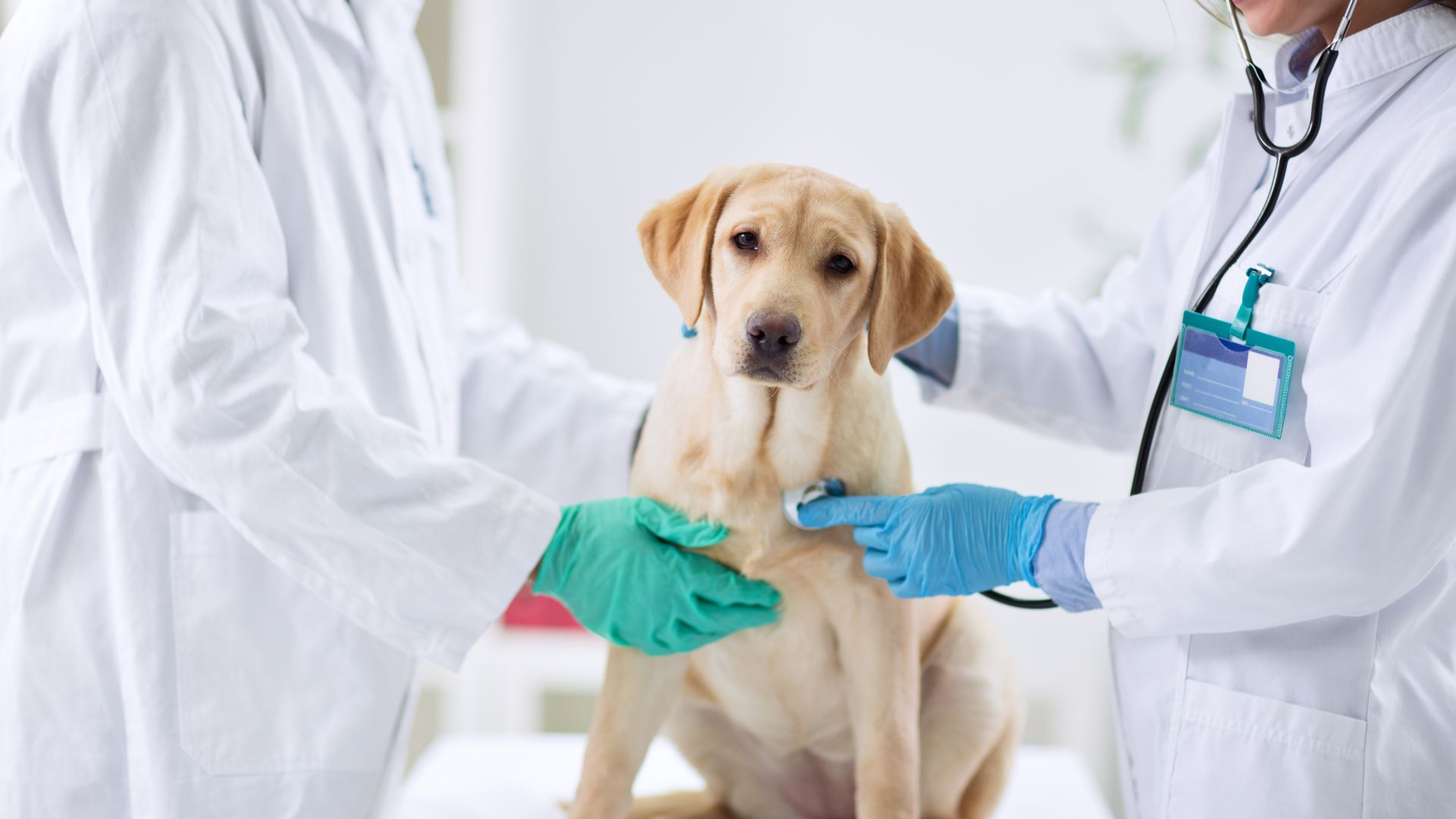
If you suspect your dog ate something toxic or harmful, like a lollipop containing xylitol, or any sugar free lollipops, don’t hesitate to contact a professional who can help guide you through the next steps. Your veterinarian is best equipped to give informed advice about what actions should be taken based on the specifics of each situation and will be able to provide treatment tailored specifically for your pet. It’s important not to wait too long when seeking help because certain conditions, like xylitol poisoning, require immediate attention to prevent potentially life-threatening complications from occurring.
Some other signs that may signify a health emergency include loss of consciousness and difficulty breathing – both are important signals indicating that medical attention is needed immediately! Remember – prevention is always better than cure!
Ensure all choking hazard candy and sweet treats are kept out of reach for your dog. With some caution and care, you can help ensure your dog stays healthy and happy.
Alternatives to feeding your dog lollipops
The Importance of Choosing Safe Dog Treats

While giving your dog a taste of whatever snack you enjoy can be tempting, it’s important to remember that not all human foods are safe for dogs. In fact, many common snacks like lollipops can be dangerous and even toxic for dogs. To keep your furry friend healthy and happy, it’s essential to choose safe and healthy dog treats instead.
Healthy Treats That Are Safe for Dogs
Fortunately, there are many delicious and nutritious treats that are perfectly safe for dogs to enjoy. Some great options include carrots, apples, plain popcorn, unsalted peanut butter, and frozen yogurt. These treats can provide your pup with important vitamins and minerals without any unwanted additives or artificial ingredients.
Tips on How to Train Your Dog to Avoid Harmful Substances
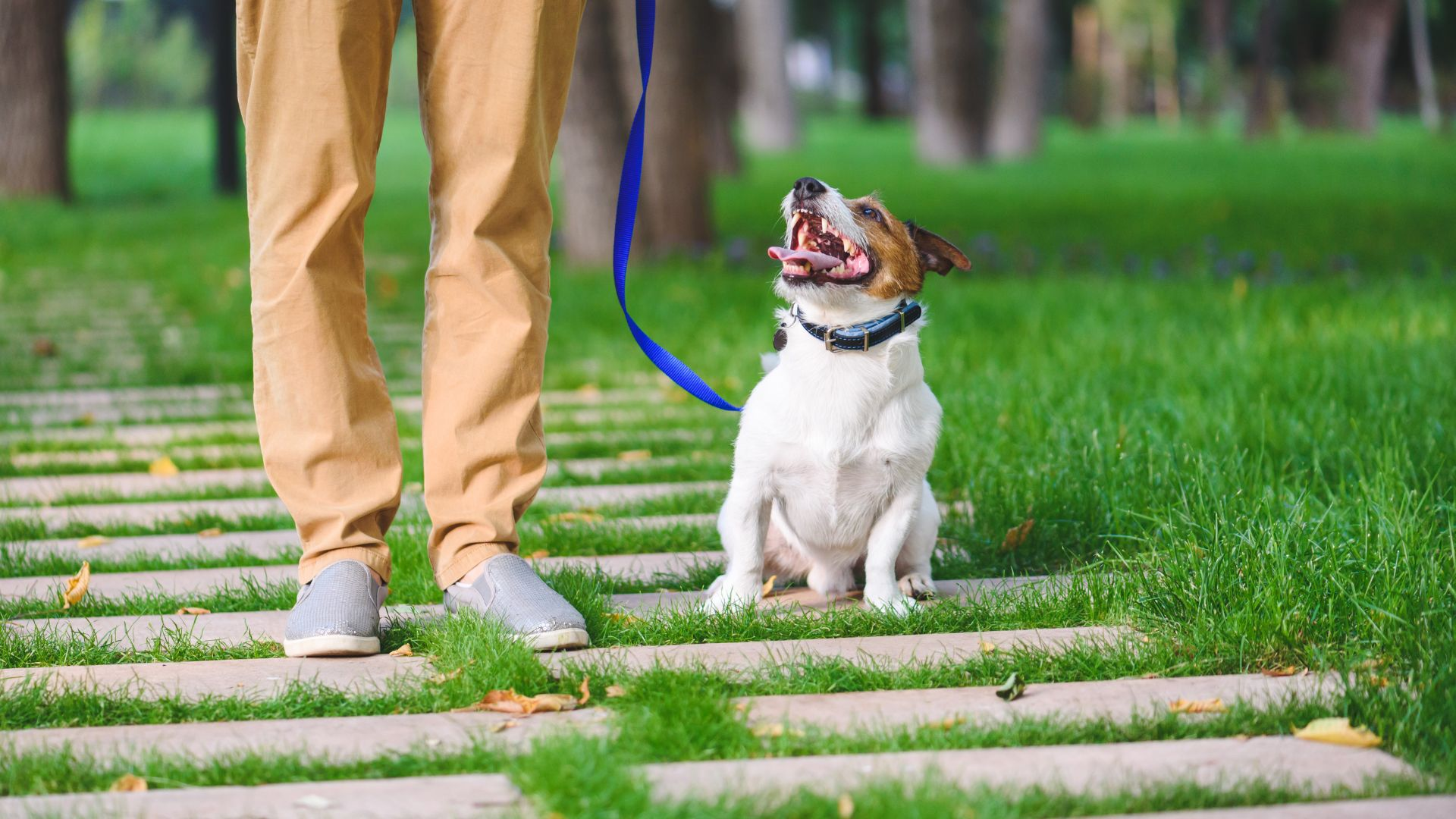
Training your dog to avoid harmful substances is an important part of responsible pet ownership. One effective way to do this is by teaching the “leave it” command. To do this, simply hold a treat in one hand while saying, “Leave it.”
As soon as your pup looks away from the treat towards you, reward them with a different treat from your other hand. With consistent practice over time, your pooch will learn to obey the “leave it” command even when faced with tempting goodies like lollipops.
It’s also important to supervise your dog at all times and keep harmful substances out of reach. By choosing safe treats and teaching good habits through training exercises like the “leave it” command, you can help ensure that your furry friend stays healthy and happy for years to come!
Why it’s not safe for dogs to eat lollipops
It’s important to recognize that lollipops should never be given as a treat to your dog. The sugar, artificial sweeteners, and other ingredients can be harmful and even fatal if your dogs eat candy. Dogs are not equipped to digest these substances, which can lead to a range of health complications, including vomiting, diarrhea, dehydration, and more severe conditions such as pancreatitis.
Moreover, lollipops pose the risk of choking hazards or damage to your dog’s teeth when chewed incorrectly or just the too much sugar in them. Therefore, it’s crucial that you keep all sweets and candy out of reach from your furry friend.
Encouraging responsible pet ownership
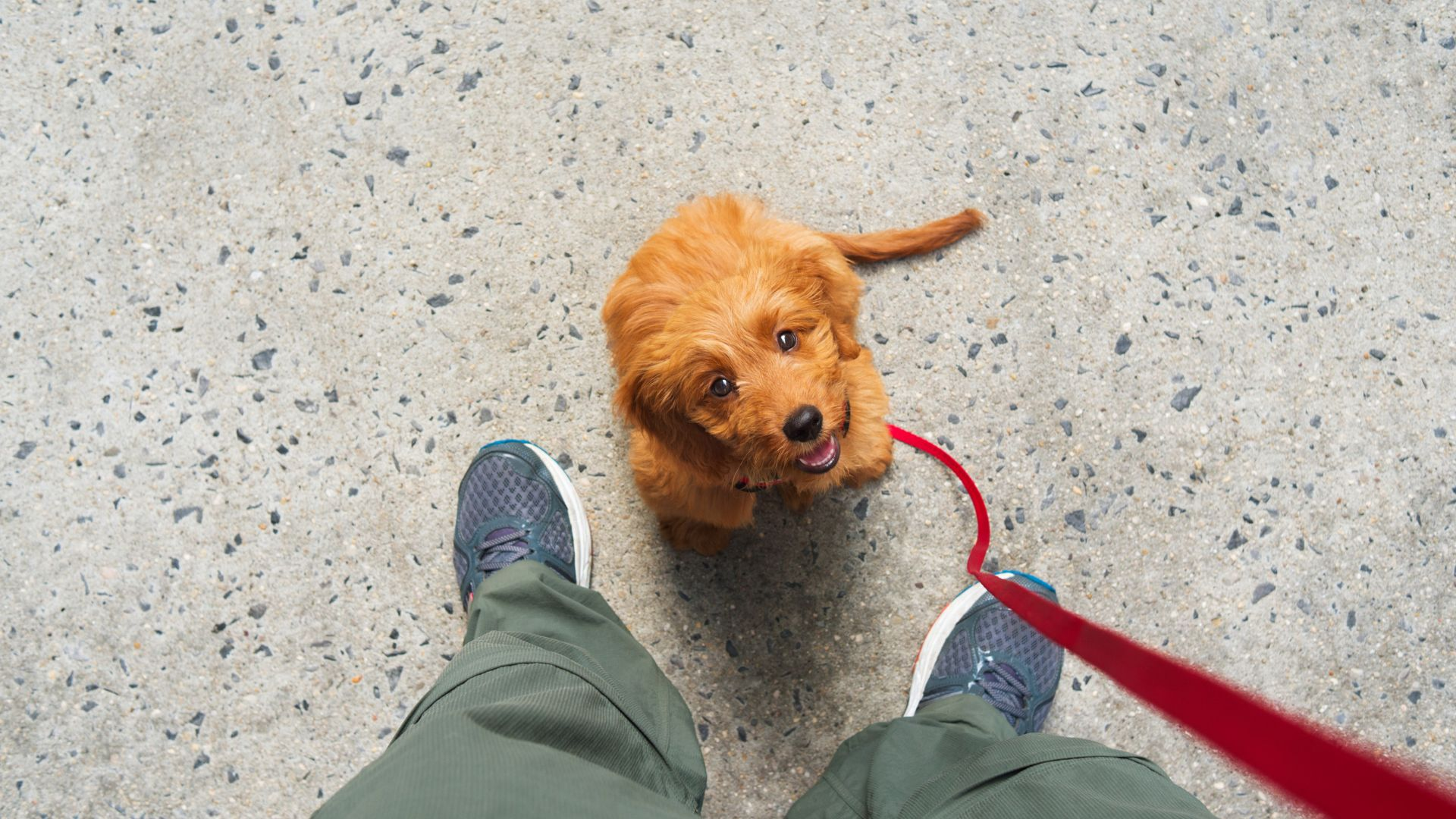
As responsible pet owners, we need to be aware of the food we give our dogs. It is our responsibility to ensure they are healthy and safe at all times. Thus, when choosing treats for your dog, opt for healthy options instead of sugary snacks like lollipops.
Some healthy treats include fresh fruits such as apples or bananas (make sure they are seedless), carrots or green beans (steamed), peanut butter (without xylitol), or plain boiled chicken breasts. Make sure any new food introduced into their diet is done so in moderation so their stomachs have time to adjust.
Being mindful about what you feed your furry friends ensures that they maintain a happy & healthy lifestyle. Choosing nutritious snacks over candy will help them remain free from health complications like upset stomach and the chocolate toxicity and give them the energy needed for playtime!
Frequently Asked Questions
What actions should I take if my dog consumes lollies?
If your dog eats lollies, monitor them and eat them closely for signs of distress and contact your vet immediately. Lollies often contain sugar and sometimes xylitol, both of which can be harmful to dogs.
Are Dum Dums harmful to dogs?
Dum Dums could be harmful to dogs due to their sugar content. If a dog ingests them, especially if eaten in large quantities, it could lead to some digestive tract issues or even serious health problems like xylitol toxicity if the candy contains it.
Which types of candy are poisonous to dogs?
Any candy containing xylitol, dark chocolate,, or high amounts of sugar can be toxic to dogs. This includes sugar found in many common candies like chocolate bars hard candies, gummy candies, and sugar-free candies.
Is it acceptable to allow my dog to lick candy?
It’s not advisable to let your dog lick candy. Even candy wrappers with a small amount of harmful ingredients (like xylitol) can be dangerous, toxic to dogs, and the high sugar content isn’t good for their health.

